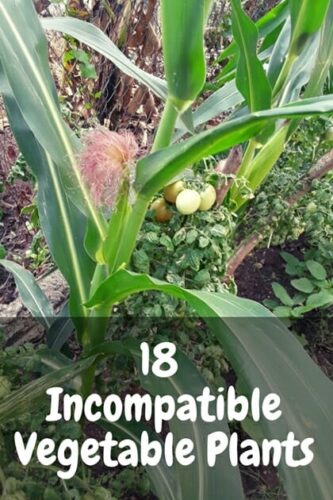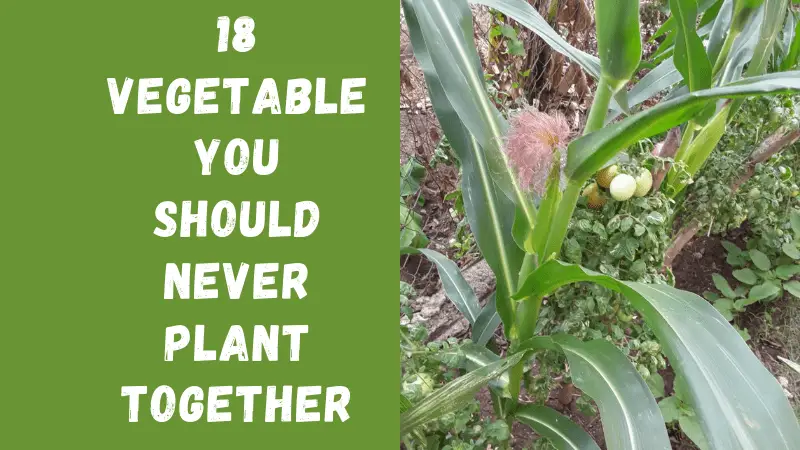What vegetables should you never plant together?
The reason why some vegetables cannot grow together is because of competition. Just like humans, animals, and other living things, we compete a lot with each other.
However, when it comes to vegetable plants as a whole, they have been competing with each other for thousands of years.
Some vegetable plants have roots that give out chemicals that poison other plants.
Some aren’t that bad together; however, they are competing for the same scarce resources and trying to grab so many that the competition has starved.
So why is that?
Well, another reason why most vegetable plants compete and don’t go well together is that they have the same diseases that are common to both and also lack hybridization.
For example, if you grow different hot chili peppers and nonhot peppers, such as sweet peppers, together, they will be cross-pollinated and may either become hotter or nonhot peppers.
These diseases found on chili pepper plants may do more harm to the other pepper plant or even decrease the heat in the hotter peppers.
As an experienced gardener and part-time farmer, companion planting is a real thing, and you can tell the difference when you plant the wrong vegetable plants or crops next to each other.
One or both vegetable plants will not thrive or produce as well as they would separately. However, some do exceptionally well together, like beans and squash.

18 Incompatible Vegetable Plants
What Are Some Of The Most Incompatible Plant Combinations?
One of the main resources plants compete for is space; others might attract damaging insects or fungi.
Your vegetable garden is almost like a neighboring community. Some neighbors in the community live quietly next to each other, while others are loud and demand their own space.
Some neighboring plants will rob valuable nutrients from other nearby neighboring plants too. So make sure to plant companion plants that can happily coexist with each other.
So, what are the non-companion plants?
Here are a few plants that don’t complement each other that well. We can refer to them as incompatible plant combinations listed below.
Tomatoes and Sweet Corn
When it comes to soil nutrients, tomato, vegetable, and sweet corn plants fight and compete with each other for nutrients if planted too close together.
Tomato hornworms and other types of fungi love sweet corn and tomato plants, so separating the two prevents the mass extinction of both.
Tomato plants also don’t like cabbage or potatoes growing beside them. Instead, the best thing to plant besides tomatoes is lettuce. Lettuce will help shade and keep the soil moist for the water-loving tomatoes.
Onions and Beans
Onions and bean vegetable plants do not go well with each other. Beans, on the other hand, are considered allelopathic plants.
This means they produce biochemicals that can hinder the growth of another plant, such as the bean plant.
However, beans do not do well with members of the onion family, including leeks, chives, and garlic.
Beans and carrots complement each other well by giving each other nutrients that encourage growth.
The same cannot be said for beans and onions. Carrot vegetable plants also help beans by attracting ladybugs that keep aphids from damaging their leaves.
Potatoes And Sunflowers
Potatoes and sunflowers are not companion plants. One of them grows deep, and the other grows shallow in the soil.
This is one of the reasons why they don’t get along. Sunflower seeds contain a toxic ingredient that prevents potatoes from growing to their full potential.
It’s ideal for growing spinach vegetables for early harvest around the potatoes before the potato plants need soil mounding.
Celery and Carrots
I used to plant celery and carrot plants together, but these plants should avoid each other in the garden.
Both of these vegetable plants need water and shade and seek love to be around taller, leafed-out companions like beans to keep the soil moist.
The ideal plant companion to celery is thyme. Thyme will smother weeds and moisten the soil.
Garlic and Asparagus
As for garlic and asparagus, these two incompatible plants share the same need for nutrients in the soil. The asparagus plant is a real quitter if it can’t get the sufficient nutrients it needs.
Your best bet is to give asparagus plants their own bed or growing space with no competition. However, if you want to give it a growing partner or friend, try parsley or dill.
Eggplant and Fennel
The eggplant plant is a member of the nightshade family, and the fennel plant produces a chemical that slows nightshade growth.
So, instead, grow bush beans as eggplant’s companion. Eggplant plants love the nitrogen that the bush beans add to the soil; also, the bush beans repel the Colorado potato beetle, which has a taste for eggplant.
Cucumber and Rosemary
Cucumbers and rosemary are not companions of vegetable plants. Cucumbers can take on the flavors of strong herbs, so keep rosemary, basil, and sage away until blending them into a delicious salad in the kitchen
Remember to allow cucumbers to vine by giving them a trellis on which they have space to grow up, which helps them avoid rotting on moist soil.
Carrots and Parsnips
Carrots and parsnips are vegetable plants, not companion plants. These two plants’ root crops like the same growing conditions, however, both are susceptible to the carrot root fly.
However, it’s best to give them their own space, far apart from each other.
Both the carrot and parsnips plants would rather line up with radishes, as the little round radish grows quickly.
Once the radishes vegetables are harvested, there is growing space between the longer-growing carrot or parsnip.
Pumpkins and Squash
Pumpkin plants are very aggressive garden plants. They can choke out squash plants, such as zucchini, and compete for water and space.
When it comes to pumpkins, plants will cross-pollinate with other squash varieties, affecting your harvest.
Pumpkins like to crawl and snake up corn’s thick stalk. The two vining vegetables are harvested at different times, so they won’t compete for precious water in the late summer.
So, if you have a garden, these are some of the vegetables you should never plant together; there is always competition between them. Nevertheless, instead, plant them separately from each other.
Related: How long do bean seeds take to germinate?




